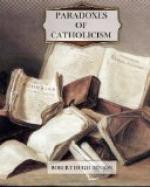VII
AUTHORITY AND LIBERTY
The truth shall make you free.—JOHN VIII. 32.
Bringing into captivity every understanding to the obedience of Christ.—II COR. X. 5.
We have already considered in outline the relations between Faith and Reason; how each, in its own province, is supreme and how each, in its turn, supports and ratifies the other. We pass on to a development of that theme, springing almost immediately out of it, namely, the relations between Authority and Liberty. And we will begin that consideration, as before, as it is illustrated by the accusations of the world against the Church. Briefly they are stated as follows.
I. Freedom, we are told, is the note of Christianity as laid down in the Gospels, in both discipline and doctrine. Jesus Christ came into the world largely for this very purpose, to substitute the New Law for the Old and thereby to free men from the complicated theology and the minutia of religious routine which characterized men’s attempts to reduce that Old Law to practice. The Old Law may or may not have been perfectly adapted, when first it was given, to the needs of God’s people in the early stages of Jewish civilization; but at any rate it is certain, from a hundred texts in the Gospel, that Jesus Christ in His day found it an intolerable slavery laid upon the religious life of the people. Theology had degenerated into an incredible hair-splitting system of dogma, and discipline had degenerated into a multitude of irritating observances.
Jesus Christ, then, in the place of all this, preached a Creed that was essentially simple, and simultaneously substituted for the elaborate ceremonialism of the Pharisees the spirit of liberty. The dogma that He preached was little more than that God is the Father of all and that all men therefore are brothers; “discipline” in the ordinary sense of the word is practically absent from the Gospel, and as for ceremonial there is none, except such as is necessary for the performance of the two extremely simple rites that He instituted, Baptism and the Lord’s Supper.
Now this supposed spirit of liberty, we are informed, is to-day to be found only in Protestantism. In that system, if it can strictly be called one, and in that system only, may a man exercise that freedom which was secured to him by Jesus Christ. First, in doctrine, he may choose, weigh, and examine for himself, within the wide limits which alone Christ laid down, those doctrines or hopes which commend themselves to his intellect; and next, in matters of discipline, again, he may choose for himself those ways of life and action that he may find helpful to his spiritual development. He may worship, for example, in any church that he prefers, attend those services and those only which commend themselves to his taste; he may eat or not eat this or that food, as he likes, and order his day, generally, as it pleases him. And all this, we are informed, is of the very spirit of New Testament Christianity. The Truth has made him free, as Christ Himself promised.




